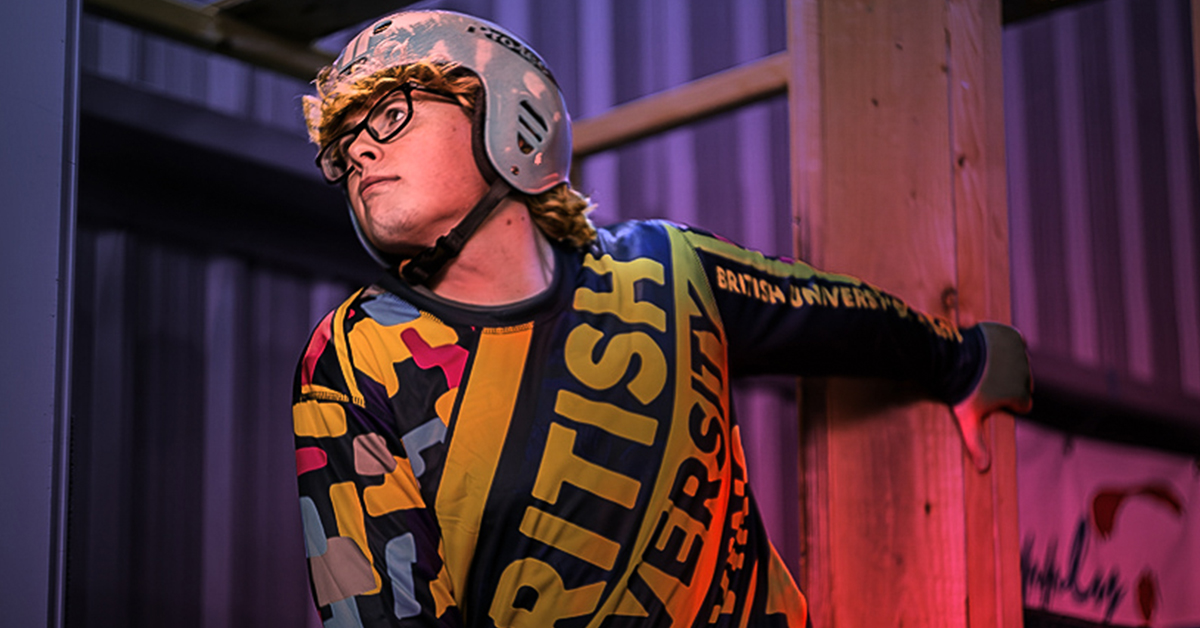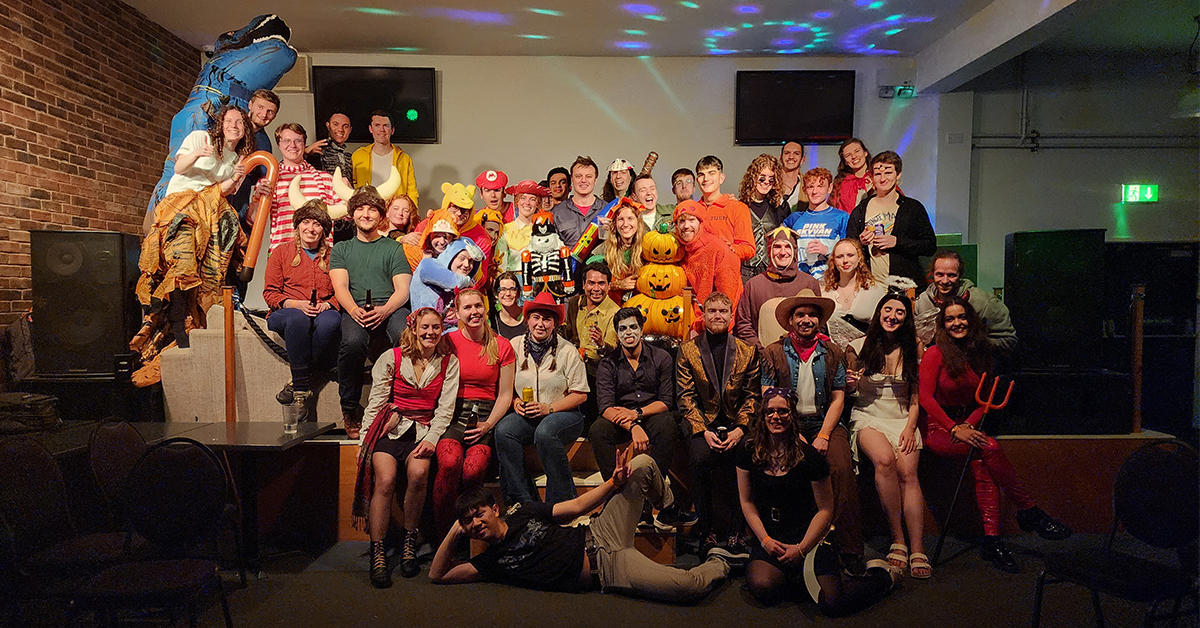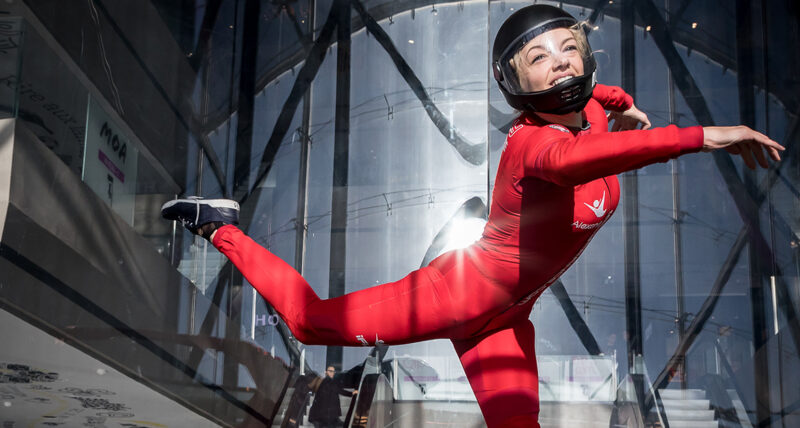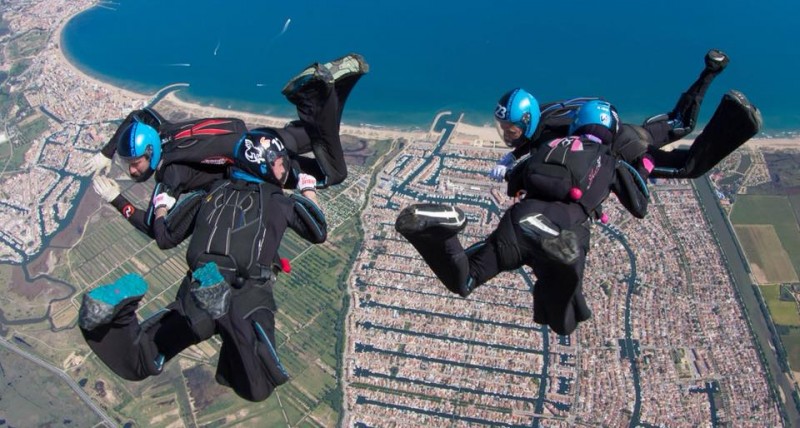British University Skydiving is saving you a seat
All images courtesy British University Skydiving
See, the thing is: it’s about the jumping, but it’s not really about the jumping. Not entirely, at least.
“When [the BUS tour] went to Denmark,” muses British University Skydiving member Sebastian Taylor, “the first three days were completely weathered out. But I think I’ve had more fun in those three days than I’ve had in much of the rest of my skydiving career.”
It’s fair to say that British University Skydiving (BUS), with its cheery, Skittle-toned logo, its chockablock calendar of events and its impressive viral outreach, has an outsized impact for a scrappy student association. For 40 years, this ever-changing motley crew of volunteer students and alumni has successfully beaten the drum of creating an inclusive community to accommodate and promote the sport of skydiving – and this particular bus is showing no signs of slowing down.
“As much as this whole thing is called skydiving,” Sebastian goes on, “it feels to me that very little actually is about the jumping – or at least far less than you’d assume. The qualities that make people stay in the sport all come down to relationships; to the people. Capitalising on that fact has created a core group in BUS that is doing a lot to keep skydiving, as a sport, alive.”
The organisation takes that charter seriously. Any monies that come in are immediately reinvested back into the membership in the form of regular skydiving-based events, trips, and parties across the UK, with the goal of helping members to progress their skills, make new connections, explore new skies (and get a little crazy, as any self-respecting uni student must do).
There’s a rich history here, too – from humble beginnings in the mid-1970s to the org’s current status as a well-established, nationally recognised organisation – demonstrating how the association has been instrumental in shaping the careers and lives of many, many skydivers, from the current crop of wide-eyed freshers to crowds of folks who threw their caps long, long ago.
Early days
BUS wasn’t always quite so snappy-of-title. The org officially began under the banner of the British Collegiate Skydiving Association (BCPA) in 1977, rustled up in response to the increasing number of comp-hungry, community-minded skydivers matriculating through university (research confirms earlier, unofficial mentions as far back as 1975).
The first recorded BCPA meet-up brought together 114 participants from a whopping 15 different universities. The routines were decidedly basic – judged predominantly on the stability of static-line exits, alongside landing accuracy. A couple of individual style events made it into the mix, too.
While the jumping, admittedly, wasn’t spectacular, the event caught on like wildfire: probably, because of the high vibe on the ground. It wasn’t long before these successes led to the BCPA joining forces with the broader British Parachute Association, legitimising the BCPA’s existence within the sport.
Initially, just a handful of BCPA clubs operated, concentrated at the largest UK universities. As the BCPA integrated into the BPA and spread, that number grew to more than 50. BCPA groups hailed from regions from Plymouth and the South Coast all the way up to the Scottish Highlands. These clubs organised regular meets, competitions, boogies and just plain parties, reinforcing the community’s strength and reach – and establishing a powerfully inclusive culture where even the newest of newcomers were (and still are) encouraged to participate, learn, and gradually build their abilities among like-minded peers from every corner of Ol’ Blighty.

Quite a competitive streak
As the association matured, its competitive events grew in scale and scope. Before long, the BCPA’s scrappy collegiate activities had been successfully integrated into the considerably more formal proceedings of national skydiving competitions.
By the time the Intercollegiate Championships bubbled into existence, the number of involved jumpers started to hockey-stick upwards. BCPA competitive events “graduated” from the perhaps cringey territory of basic static-line competence and evolved into full-fledged RW (now FS) competitions: first, 4-way; before long, all the way up to 16-way. In recent years, these competitions have expanded to embrace free flying, freestyle, and dynamic tunnel flying.
Birth of the BUS tour
Although attempts were made to organise international meets – in particular, sending teams off to compete in the US – funding (and the logistical challenges of the often-overburdened schedule of a typical university student) hampered the effort. With that said: while overseas BCPA competing never really made it off the runway, the BCPA community sure did.
In the 1990s, “tours” (both foreign and domestic) became a hallmark of the association. Keen cohorts of BCPA jumpers began to regularly descend upon various air sports meccas in the US and Europe. Members got the chance to jump in different environments and learn new skills. They also got the chance to engage in some top-shelf tomfoolery, complete with DJs, unhinged, absolutely-not-skydiving-related bar contests, and the collaborative generation of an extraordinary amount of lore (and aprés-event swearing-to-secrecy, of course).
Getting serious, now
Sure, the tours are the beating heart of BUS. However, semi-feral overseas partying certainly isn’t the only purpose BUS serves the UK skydiving community.
Many BCPA (later, BUS) alumni have gone on to become instructors, national champions and influential figures in the sport. The association has, for nearly half a century, provided a practical environment facilitating beginners to progress from uncertain beginnings towards the mastery of advanced disciplines in a supportive atmosphere with just enough competition to keep it interesting.
Plenty of BUS members have progressed into leadership roles both inside and outside of the association, building not only a repertoire of technical skills but also lifelong friendships (and professional networks, to boot).
Looking ahead
As you see, then, British University Skydiving isn’t just about skydiving. It’s about community, growth, and the enduring spirit of adventure – and its members are engaged in an ongoing effort to keep its traditions alive while embracing new trends in skydiving, and all while struggling against the same forces that pose a direct challenge to the sport at large. According to Sebastian Taylor, it’s all surmountable – and indeed, these will all be fun and interesting projects for the incoming cohort to work on, together.
“It’s so fluid, and there’s a lot more to build, and a lot of room for growth and improvement,” Taylor explains. “BUS needs passionate people who see how things could be revolutionised or reformed, and then take it on as a personal challenge – we need ideas for how to take this forward in the most powerful way. If I have any legacy in BUS, it would be hopefully to inspire and empower people to take initiative and execute their ideas.”
“BUS,” he smiles, “isn’t anything more than the people in it.”




